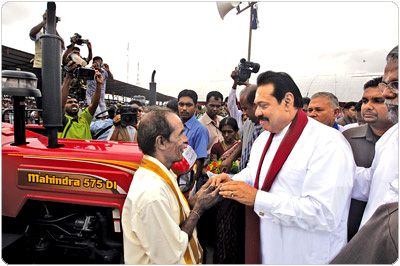|
Empowering low income earners:
National poverty alleviation drive
By Uditha Kumarasinghe
 While
overcoming poverty has become the major challenge in the world, the UPFA
Government has implemented the “Samurdhi” program as the national
poverty alleviation drive in Sri Lanka to promote untapped capabilities
and organisational and institutional abilities of low income earners and
thereby empowering them productively and efficiently in a pro poor and
sustainable manner, to redeem them from poverty. While
overcoming poverty has become the major challenge in the world, the UPFA
Government has implemented the “Samurdhi” program as the national
poverty alleviation drive in Sri Lanka to promote untapped capabilities
and organisational and institutional abilities of low income earners and
thereby empowering them productively and efficiently in a pro poor and
sustainable manner, to redeem them from poverty.
Samurdhi which was introduced by then newly elected People’s Alliance
Government in 1994 as the national program to alleviate poverty has
played a more significant role in the socio-economic fabric of Sri Lanka
over the past 16 years to find a more practical solution to the problem
of poverty.
However, it is not an easy task to alleviate poverty, but the present
Government based on the ideals and goals of the Samurdhi program has
given priority to activities such as development of rural infrastructure
facilities, improving health and nutritional conditions among rural
community and create opportunities for them.
|
The UPFA Government has
been able to turn the Samurdhi program into a movement which
harnesses the people’s potential and channel it to mainstream
development. Three major development approaches, namely welfare,
rural development and social mobilisation were the basis on
which the Samurdhi program was launched to alleviate poverty |
At present Samurdhi program has been implemented in 316 divisional
secretariat divisions in 25 districts. The main thrust of the Samurdhi
program is poverty reduction by ensuring participation of the poor in
the production process. The responsibility of implementing the Samurdhi
program was vested into the new Samurdhi, Youth Affairs and Sports
Ministry established in 1994.
Poverty alleviation
In addition, Sri Lanka Samurdhi Authority (SLSA) was established by
the Government in 1994 as the key State mechanism to launch the
Government’s poverty alleviation programs in a productive manner to
realise its objectives.
In 2004, the Ministry’s name was changed to Samurdhi and Poverty
Alleviation Ministry and again it was converted as the division of
Samurdhi under the Nation Building and Estate Infrastructure
Development.
At present the UPFA Government under the leadership of President
Mahinda Rajapaksa has made a concerted effort to alleviate poverty by
bringing the Samurdhi and poverty alleviation programs under the purview
of the Economic Development Ministry.
Samurdhi
The UPFA Government has been able to turn the Samurdhi program into a
movement which harnesses the people’s potential and channel it to
mainstream development. Three major development approaches, namely
welfare, rural development and social mobilisation were the basis on
which the Samurdhi program was launched to alleviate poverty. During the
past decade, the SLSA through the implementation of Samurdhi program has
successfully faced to the challenge of reducing the country’s poverty.
The implementation of Samurdhi program has made a direct impact on
the reduction of poverty in the country. At the inception of the
Samurdhi program, the percentage of the country’s poverty level remained
at 28.8 percent.
However, this percentage had been reduced to 7.5 percent in 2010 due
to the effectiveness of the poverty alleviation mechanism launched by
the Samurdhi Movement.
Empowered
A large number of Samurdhi beneficiary families who have been
socio-economically empowered by various livelihood development projects
introduced by the SLSA, have returned their Samurdhi beneficiary cards
to the Government, which is an evidence of Samurdhi contribution made to
ameliorate their living conditions.
In a world where poverty is increasing, the beginning of a reverse
trend which is quite encouraging and satisfying is observed in Sri
Lanka.
Therefore the intention of the SLSA is to make further concerted
efforts through the Samurdhi program to reduce poverty in Sri Lanka by
making its effective contribution towards the Government’s ultimate goal
of building up a prosperous Sri Lanka.
President Mahinda Rajapaksa as pledged in his “Mahinda Chintana
manifesto” directed the authorities to increase the existing Samurdhi
subsidy by 50 percent in December 2005.
Fulfilled
This will go down in the country’s history as the main pledge
fulfilled by the Mahinda Chintana manifesto. Therefore as pledged in the
Mahinda Chintana, the Government through the Samurdhi Movement has
largely alleviated poverty and improved the socio-economic conditions of
a large number of the country’s deserving poor. The Government through
the Samurdhi Banks established countrywide, has formed an effective
network to cater to the needs of the poor.
The Samurdhi Bank system was introduced with the sole intention of
providing financial assistance to Samurdhi beneficiaries to enable them
to stand on their own strength.
As a micro finance institution, Samurdhi Banks provide small and
large scale credit to Samurdhi beneficiaries on mutual trust to overcome
their financial difficulties.
A total of 2,769,859 Samurdhi beneficiaries have obtained the
membership of Samurdhi Banks. |